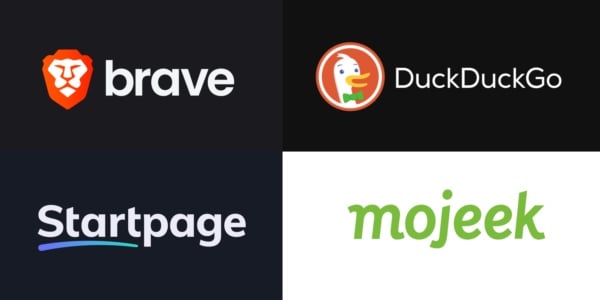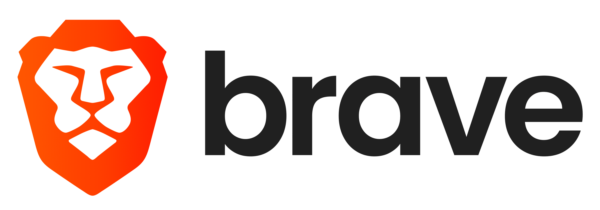Which search engine is the most private? Google & Bing vs. Brave, DuckDuckGo, Startpage, Mojeek, Qwant
Posted on
by
Kirk McElhearn and Joshua Long

Google and Bing—the main search engines that people use to find information—are designed to collect data from users in order to monetize their free services. An increasing number of users have found them too invasive, and prefer using privacy-focused search engines. There are a number of these, and they use different methods to ensure user privacy.
In this article, we will explain why Google and Bing are detrimental to your privacy. And, more importantly, we will highlight some search engine alternatives you can use if you care about preserving your privacy online.
In this article:
- How Google and Bing collect user data
- Types of alternative search engines
- “Privacy-friendly” doesn’t mean ad-free
- Privacy-focused search engines with their own indices
- Proxy-based, privacy-focused search engines
- How to change your default search engine on iPhone, iPad, Mac, and more
How Google and Bing collect user data
The two largest search engines, Google and Bing, collect user data in order to monetize your online behavior. These search engines collate user activity and create user profiles, which they then use to serve personalized ads.
It’s beyond the scope of this article to go into detail about how this profiling works. Suffice it to say that they use your search terms, clicked links, and the amount of time you spend looking at search results to make inferences about you. They also collect your location data, determined by your IP address as well as your search history. Additionally, they analyze behavioral activity, and they collect device fingerprints—which include details about the device and operating system you use, and more.
If you’re signed into your Google or Microsoft account, this ad profile is enhanced by other forms of data collection. For example, Google or Microsoft collect data from your use of Gmail or Outlook email, and your activities with their other apps and services. Even if you aren’t signed in or don’t have such accounts, these search engines use cookies to track your activity on the internet. Google particularly leverages its free Google Analytics tool, which gives webmasters information about their website traffic, to track user activity.
Suffice it to say, Google and Bing are not private in any way. Yahoo is not much better; its tracking and advertising infrastructure just might not be quite as massive as Google and Microsoft. Since 2009, Yahoo has been powered by Bing.
Types of alternative search engines
In order for a search engine to be effective, it needs to provide good results. Unfortunately, Google has a reputation of providing the best search results in the industry, so its dominance is a perpetual cycle; people have the perception of a positive experience when using it, so they keep coming back to it.
So, how do privacy-focused search engines work? There are two main ways they try to stay competitive with the big players.
The first is by creating their own indexes. Like Google and Microsoft, they use web crawlers (bots) that analyze websites around the world. This is a costly and time-consuming task, but alternative several search engines do this.
The other option is to serve as an anonymous proxy to Google or Bing. This means that when you search for something, the search engine forwards your search, stripped (to the degree possible) of any personal information, and returns the results. This allows you to access the breadth and depth of Google or Bing without your personal data being collected.
Some hybrid search engines combine the two technologies.
“Privacy-friendly” doesn’t mean ad-free
Just like the juggernauts, many alternative search engines display ads. Privacy-focused search sites generally do not personalize the ad results, other than being related to your search query.
It isn’t cheap to run any site that gets a lot of traffic, let alone a search engine. So, although we may not like ads, they’re a main source of revenue for even privacy-focused seach engines. Without ad revenue, they would need to rely primarily on donations or other monetization options to survive. This means they would likely have to constantly harass users for money—for which Wikipedia is notorious.
Privacy-focused search engines with their own indices

Brave Search
Brave Search has its own index, and you can use Brave Search with any browser, or in the Brave browser. This search engine is ad-supported, but the California-based company claims that “ads adhere to the principle of privacy-first.” According to Brave, this search engine doesn’t collect user data; rather, it offers private, anonymous search.
Brave Search also claims to “not filter, downrank, or censor search results.” This search engine doesn’t use algorithmic weighting, which allows search engines like Google to be played by SEO-heavy websites. As you use Brave Search, you can uprank or downrank domains to ensure that your search results are more personalized, and to filter out websites that you don’t want to see.
Brave Search also has an ’Answer with AI” button that you can disable in the search settings. If you leave this enabled, many searches offer AI-generated content, which may or may not be reliable.

Mojeek
Mojeek is another search engine that has its own index, and search results display according to the company’s own algorithm. The UK-based company claims that it doesn’t track users; while they do log some information, they say they will never sell this to any third party. Mojeek says that IP addresses stored in these logs are replaced by two-letter country codes, and the data is kept “for the sole purpose of storing historical traffic volumes and country demographics of our visitors.”
When you search on Mojeek, there is a “Summarize these results” link in the sidebar and a Summary tab above the search results. You can click these to get an AI-generated summary of the top results.
Proxy-based, privacy-focused search engines

DuckDuckGo
DuckDuckGo search is available as one of the options for Safari, as mentioned above, but the company also has its own DuckDuckGo browser for Mac, Windows, iOS, iPadOS, and Android, as well as a number of browser extensions.
According to DuckDuckGo, the Pennsylvania-based company does not track users nor store any search history. The DuckDuckGo browser also blocks trackers, further enhancing privacy. Most search results on DuckDuckGo come from Bing, but the company also uses specialized sites and search engines for certain search categories.
DuckDuckGo does not offer AI-enhanced searches; however, it does provide DuckAI, a chatbot interface allowing users to choose from multiple large language models and access them anonymously.

Startpage
Startpage offers private searching and “unprofiled search results, delivering the same information to any user.” The Netherlands-based company also says that this search engine never records personal data or search history, user IP addresses are removed from their servers, price trackers are blocked, and “Anonymous View browsing masks user’s identity on other websites.” Based in the Netherlands, it uses “strict European privacy standards.”
Interestingly, Startpage is a proxy for both Bing and Google, sending searches anonymously to these search engines and returning the results privately. It offers a mobile app for iPhone and Android.
Qwant
There’s one more currently proxy-based search engine that deserves a mention, though it’s in the midst of a transition at the time of publication.
Qwant‘s motto is “The search engine that values you as a user, not as a product.” The France-based, Europe-hosted company says it doesn’t sell your private data, and doesn’t retain your search data. If you create an account, you also get “Qwant artificial intelligence” features as a bonus.
Historically, Qwant has primarily been a Bing search proxy. However, in November 2004, the company announced that it was partnering with Ecosia to create a new France-based company, European Search Perspective. The new company has plans to build its own index, but not rely on it exclusively:
“EUSP will develop a privacy-first search index, which will be used by both Ecosia and Qwant. Unlike proprietary solutions, EUSP’s index will be available to other independent search engines and technology companies. Both firms will continue existing back-end tech partnerships to ensure the best possible results and product for their respective user-base.”
Thus, Qwant is switching to a hybrid, metasearch model at some point; it will rely on both its own index as well as Bing’s. Qwant has apps for iPhone, iPad, Mac, Apple Vision Pro, and Android.
How to change your default search engine on iPhone, iPad, Mac, and more
You can, of course, type the URL of any search engine to use it in any web browser. But you may also want to choose which one is used automatically when you type a query into your browser’s navigation bar.
Apple allows you to choose from several options in its Safari browser.
To make this selection on a Mac, first open Safari. Then, from the Safari menu, choose Settings… > Search, and choose one of the options from the “Search engine” menu.
On iPhone, iPad or Apple Vision Pro, first open the Settings app. Then scroll down and tap Apps > Safari, and then tap on Search Engine to make a selection.
For most regions of the world, Apple offers the following five search engines:
- Yahoo
- Bing
- DuckDuckGo
- Ecosia
If you are in the EU or certain other regions, you may have additional options; these may include, for example: Yandex, or Baidu and Sogou.
The only search engine on this list that is privacy-focused is DuckDuckGo. For other search engines, you will need to access their URLs from a bookmark, favorite, or other link.
For details on how to switch your search engine in Google Chrome, Mozilla Firefox, or on Apple Vision Pro, see our deeper dive article; “How to switch search engines—and why you should.”
How to switch search engines in Safari or Chrome—and why you should
The search engine you use can collect a great deal of personal data about you; after all, you may often query it about things like your health, your finances, and items you want to buy. Big companies like Google and Microsoft build detailed profiles about you from this data. If you want to escape the tyranny of big tech, a privacy-focused search engine is just a click away.
How can I learn more?
 Each week on the Intego Mac Podcast, Intego’s Mac security experts discuss the latest Apple news, including security and privacy stories, and offer practical advice on getting the most out of your Apple devices. Be sure to follow the podcast to make sure you don’t miss any episodes.
Each week on the Intego Mac Podcast, Intego’s Mac security experts discuss the latest Apple news, including security and privacy stories, and offer practical advice on getting the most out of your Apple devices. Be sure to follow the podcast to make sure you don’t miss any episodes.
You can also subscribe to our e-mail newsletter and keep an eye here on The Mac Security Blog for the latest Apple security and privacy news. And don’t forget to follow Intego on your favorite social media channels: ![]()
![]()
![]()
![]()
![]()
![]()
![]()
